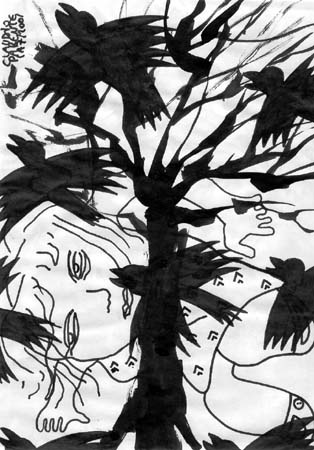Alan Catlin
( Schenectady, New York )Evie Shockley, Two PoemsThe Origins of MemoryAt the ocean's core, water is the devil's playground: talking fish walk on land or swim as they see fit, animals speak a common language with man and ice to burn as fuel for lamps, light and heat evolving as clouds, their undercarriages the bones of storms that drop to the earth as electrical charges, drums of fire sudden rains snuff; a slow drift of sodden smoke, the last remnants of something irretrievable, the black box containing all the secrets of civilizations lost, doors rusted shut, all contents let go.
( Winston-Salem, North Carolina )the changing of the guards
Anne Fraser— alexandra township, south africa, 2001if it is like the sun, rising, shining, setting, reliable as a heartbeat, we can live with it. bread tastes the way our mothers’ mealie tastes — better or worse begins there. poor, ugly, and unjust are often words for some existence beside which ours seems bright, the familiar darkness of a familial horror. * * * the president declared the state of emergency in ‘85, set up points of entry all around the township, monitored by guards who scrutinized our living and photographed faces for deviation, an army of men paid not to see what they looked at, as they counted and accounted for our endless, restless numbers. now, to go to jo’burg, we left a quarter-hour earlier than before, passing the time in queues with jokes, gossip, news of how change follows change. * * * in soweto, children were growing into their parents’ faded clothes, grumbling dissent, but numb. then a new rule required students and teachers to stutter lessons in a foreign language, the governmental tongue. the rule, meant to mute them, raised their voices to a roar. their blood spoke through any gun-imposed silences. * * * that was ‘76. we saw soldiers and police through red eyes a decade later. the township guards were uniformed, armed, but familiar, resembling brothers, sons, dear enemies. like lethal machines, in their first days, they began to take root in their posts, and finally took on flesh, as week upon week we met their glances with grudging stares, greeted them, gave them names, received ours back on passes undercut by growing recognition. one day those guards did not return, but new ones took their places, stiff with fresh distance. soon, the heat of our november, december hellos lifting above the dust, dark arms hanging out of car windows raised in casual waves, melted the replacements, who disappeared in turn. and so on. reliable. until apartheid rose and shone and set in the grave we dug for it, and did not rise again. * * * now, the booms are never lowered, and we pass in and out of the township where more elusive obstacles still contain us. this is better bread, we all agree, approaching the old checkpoints without slowing much, catching ourselves a heartbeat before our habitual hands wave at spaces left by men where no men should be. impossible that we could miss them.— for bongi dhlomo-mautloa
in this housespring light, less than eight hours old, slides down the angled, shingled roof of the bungalow next door. i am guesting in the house i own with you. you, you are minutes away in another world, and all this march wind waltzing the bare branches of the maples cannot blow me back into the kansas you carry around between your ears. i sit, head on knees, gripping my ankles fitfully, as if that pressure could distract me from my aching delivery of the monthly toll, red and jellied, paid consistently since my thirteenth spring for failing to live up to my potential. in the red blackness of eyelids shut tight appears the imagined face of a child with your mouth and my eyes, no better than we are at using them. he or she is not the answer. i am just an infant myself, your voice the giant thumb my soul fists around. nights, you are the babe, seeking in the surfaces and recesses of my body the home i never made you in this house.
( Seattle, Washington )Corey Mesler, Three PoemsRecoveryLearn to be dark as you once were, nothing – and everything, without knowledge but for the deep cold of the night sky, the moon, its one bright eye.
untitled by Claudio Parentela
( Catanzaro, Italy )
( Memphis, Tennessee )ListenerWhere Ma Rainey and Beethoven once unwrapped their bedrolls
Tuba players now rehearse around the flagpole. –Bob DylanMusic dies in me like the last plucked harp string. A coagulant replaces it, a deceptive honey. I strain to notice the backbeat; I long for the plaintive chorus, but they are no longer there. Where can I go now when the night becomes too much, when the light wavers like a balloon? I turn as if on a table. The maestro picks up a bazooka. Remember that I love you. Remember that I used to be called beautiful.My Conversation with the TVAt 3 a.m. it says something about the saints, how in the streets they danced with peasant women, lifting their skirts with lewd tools. I know better than to trust the stories one is told at 3 a.m. I know better than to think about peasant women and what they might do, given the opportunity to be alone with a saint.A Friday PoemA Friday poem is full of itself, full of the humors that plague the male, the impregnating humors. A Friday poem wants to undress you, touch you where you hum. Forgive it, the Friday poem. Its words strain the leash, its intentions are less than honorable. Unless you believe it’s all about love. This is what the Friday poem believes, too.
